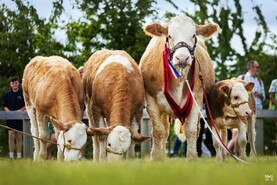Castration
There was a good discussion around castration at last Tuesday evening’s AHI/Teagasc farm walk in Donegal. The majority of dairy beef male calves being reared on farms will be castrated. More and more farmers are moving to castrate at a younger age, with the clear advice on Monday evening being that the younger you castrate male animals, the easier it is on them.
It’s important to get it right, as if it’s done incorrectly it can result in sick animals and will affect thrive for a prolonged period. One of the most important points is that it is illegal to castrate calves over six months of age without using local anaesthetic.
Good hygiene is essential to minimise the risk of infection, especially after surgical castration. It’s important that you clamp each side separately, with the burdizzo held clamped tight for a few seconds on each side to make sure the spermatic cord is cut off/crushed properly.
Make sure the burdizzo you are using is clamping tightly, as if not it may lead to unsuccessful castration. You should administer a clostridial vaccination to protect against tetanus when using banding or rubber ring method. A pain killer injection should also be used as routine when castrating.
Try and provide a clean dry environment with adequate space for movement to relive stiffness for calves after castration, outdoors is the best option at this stage in the year.
Look for swelling, signs of infection, tetanus and abnormalities. Treat wounds as needed. Seek professional advice/help from a vet sooner rather than later if calves show signs of severe pain, swelling or infection.
Slurry
With a lot of ACRES meadows due for cutting next week and ground conditions very good, now is the time to arrange getting the last of the slurry out. Every year we see weather conditions change towards the autumn and farmers get caught with slurry in tanks and with fields wet, an extension to the spreading period is called for.
Organise your contractor this week to get it spread. Cutting silage or hay will remove the most amount of P and K from fields, so it makes sense to return this offtake in the form of slurry.
Try and agitate on a day where there is some wind. Never allow children around the yard area when tanks are open and slurry is being spread.
Show season
Show season is in full swing, with agricultural shows around the country taking place every weekend from now until the end of September. Apart from seeing some of the best cattle and sheep that rural Ireland has to offer, it’s also a great way of meeting neighbours and people from towns and villages that maybe you don’t get to chat to often.
It’s a super family day out and I would urge everybody to try and make the effort to attend their local show this summer. I know local show committees are always looking for help and volunteers, so why not get involved and give something back to the community that you live in.






 This is a subscriber-only article
This is a subscriber-only article









SHARING OPTIONS: